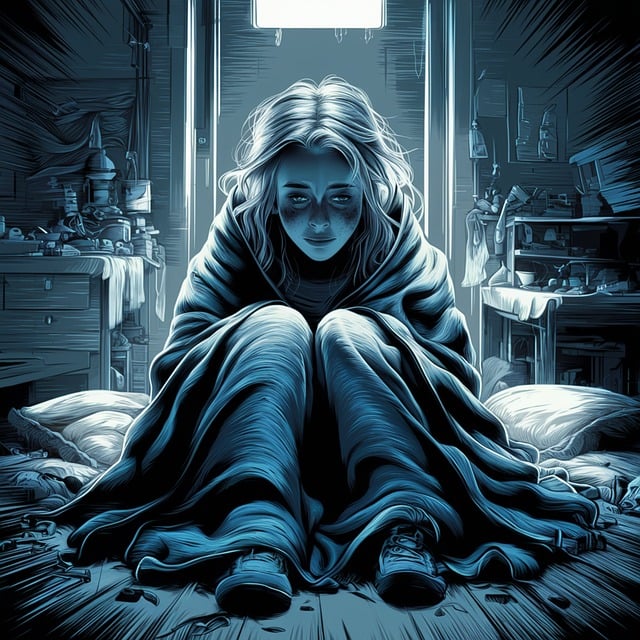Evaluating Mental Wellness Programs for Young Children with Psychosis
Understanding mental wellness programs for young children involves recognizing their unique brain de…….
Psychosis, a complex mental health condition characterized by distorted thinking and perceptions, can affect individuals of all ages, but its onset in childhood is particularly concerning. Early intervention is crucial in managing psychotic symptoms and improving long-term outcomes for young children. This article delves into the world of therapy specifically tailored for this demographic, exploring its various facets, impact, and potential. By understanding and addressing psychosis in youth, we can foster healthier development and enhance their overall well-being.
Definition:
Therapy for Young Children Psychosis refers to a specialized form of mental health treatment designed to assist children aged 3 to 12 years who are experiencing psychotic symptoms or disorders, such as schizophrenia, delusional disorders, or certain types of mood and anxiety disorders. This therapy aims to improve the child’s ability to think clearly, manage emotional responses, and navigate their social environment effectively.
Core Components:
Psychoeducation: Educating both the child and their family about psychosis, its causes, and available treatment options is fundamental. Understanding the condition empowers children to actively participate in their care.
Cognitive-Behavioral Therapy (CBT): CBT is a cornerstone of early psychosis treatment. It helps children identify and challenge negative thought patterns and behaviors, teaching them coping strategies for managing psychotic symptoms.
Family Involvement: Family therapy sessions are integral to the process as they foster better communication, support, and understanding within the family unit. Families learn effective strategies to assist their child while navigating potential challenges.
Social Skills Training: Many young children with psychosis may struggle with social interactions. This component focuses on enhancing social awareness, communication skills, and emotional regulation in various settings.
Play Therapy: For younger children, play therapy is a powerful tool for expression and learning. It allows therapists to understand the child’s internal world and help them process emotions through creative means.
Historical Context:
The concept of treating psychosis in young people has evolved over time. Historically, little attention was given to childhood psychosis, with treatment primarily focused on adults. However, increased awareness and research in the late 20th century led to the development of specialized pediatric psychiatric services. The early 21st century witnessed a growing emphasis on early intervention, with therapy becoming a cornerstone of care for children experiencing psychotic symptoms.
Psychosis in childhood is a global concern, impacting countries across all continents. According to the World Health Organization (WHO), mental disorders, including psychotic disorders, contribute significantly to the burden of disease worldwide among adolescents and young adults. The prevalence of psychotic disorders among children varies by region, with studies suggesting higher rates in developed countries compared to developing nations.
Regional Disparities:
Key Trends:
The economic impact of therapy for young children psychosis is substantial, considering both direct and indirect costs. Direct expenses include therapy sessions, medication, and hospitalization. Indirect costs arise from productivity losses among parents or caregivers who may need time off work to support their child’s treatment.
Market Dynamics:
Investment Patterns:
Economic Systems and Therapy:
Technology has revolutionized therapy delivery for young children psychosis, offering innovative tools and methods:
Telehealth: Remote therapy sessions via video conferencing enable access to care for children living in remote areas or with limited mobility. This approach is especially valuable during the COVID-19 pandemic and beyond.
Mobile Applications: Customized mobile apps can provide personalized therapy activities, parent training, and progress tracking. These tools offer flexibility and convenience for both therapists and families.
Virtual Reality (VR) Therapy: VR offers immersive experiences to help children confront fears, manage anxiety, and practice social skills in safe virtual environments. This technology shows promise in treating various mental health conditions, including psychosis.
Artificial Intelligence (AI): AI-powered systems can analyze large datasets to predict psychotic episodes or identify treatment response patterns. These tools assist therapists in making data-driven decisions and tailoring interventions.
Impact and Future Potential:
Technological advancements have improved therapy accessibility, engagement, and outcomes. The future holds even greater potential with continued innovation, including personalized medicine approaches tailored to individual genetic profiles. As technology becomes more integrated into healthcare, therapists can expect to deliver more efficient and effective treatments for young children psychosis.
The development and delivery of therapy for young children psychosis are shaped by various policies and regulations worldwide:
Despite significant progress, therapy for young children psychosis faces several challenges:
Stigma and Misunderstanding: Stigma surrounding mental health issues can deter parents from seeking help. Educating communities about the nature of childhood psychosis is crucial to reducing this barrier.
Access to Care: In many regions, especially low-income areas, access to specialized pediatric psychiatry services remains limited. Expanding healthcare infrastructure and funding are necessary to address this disparity.
Trained Professionals: There is a global shortage of child and adolescent psychiatrists and psychologists skilled in treating psychosis. Training programs and incentives for professionals working in this field are essential.
Individualized Care: Each child’s experience with psychosis is unique, making personalized treatment plans challenging. Therapists must adapt their approaches to cater to diverse cultural backgrounds and personal needs.
Proposed Solutions:
A community-based program in an urban setting aimed to improve access to therapy for young children with psychosis. The initiative involved training local primary care physicians to recognize early signs of psychosis and refer children to a specialized outpatient clinic. This collaboration resulted in:
A clinical trial explored the use of VR therapy for children with anxiety-related psychotic symptoms. The study involved 30 participants who received eight sessions of VR exposure therapy. Results showed:
The field of therapy for young children psychosis is poised for significant growth and transformation:
Therapy for young children psychosis is a critical component of pediatric mental health care, offering hope and improved outcomes for affected individuals. The global recognition of its importance has led to significant advancements in treatment approaches, technology integration, and policy support. However, challenges remain, from access disparities to the need for more trained professionals.
As research continues to unravel the complexities of childhood psychosis, therapists, policymakers, and researchers must collaborate to ensure that all children receive the specialized care they need. By embracing innovative solutions and fostering global partnerships, we can shape a future where young children with psychosis thrive and reach their full potential.
Q: How do I know if my child needs therapy for psychosis?
A: If your child exhibits persistent delusions, hallucinations, or disorganized thinking, it may be concerning. Look for changes in behavior, social withdrawal, or difficulties at school. Consult a healthcare professional for an evaluation to confirm any diagnosis.
Q: What are the early signs of childhood psychosis?
A: Early signs can include unusual thoughts or beliefs (delusions), hearing voices or other sounds that others don’t (hallucinations), disorganized speech, and behavior that appears bizarre or inappropriate. Changes in mood, energy levels, and social withdrawal are also indicators.
Q: Is therapy for young children psychosis effective?
A: Yes, numerous studies demonstrate the effectiveness of specialized therapy in improving symptoms and functioning in children with psychosis. Early intervention is key to achieving positive outcomes.
Q: Can technology really help my child’s psychosis?
A: Technology offers innovative tools like telehealth, mobile apps, and VR therapy, enhancing access and engagement. While not a cure, these technologies can support traditional therapy methods and improve your child’s overall well-being.
Q: How can I support my child during therapy?
A: Support your child by being actively involved in their treatment plan, attending therapy sessions, and reinforcing positive behaviors at home. Create a safe, nurturing environment, and communicate openly about their experiences and feelings.

Understanding mental wellness programs for young children involves recognizing their unique brain de…….

Cultural sensitivity is crucial in treating young children with psychosis, addressing disparities in…….